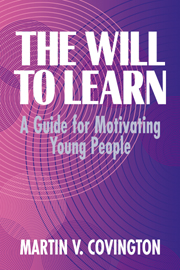Book contents
- Frontmatter
- Contents
- 1 The Future and Its Discontents
- 2 Motives as Emotions
- 3 Motives as Thoughts
- 4 Self-Worth and the Fear of Failure
- 5 The Competitive Learning Game
- 6 Motivational Equity and the Will to Learn
- 7 Strategic Thinking and the Will to Learn
- 8 An Immodest Proposal
- 9 Obstacles to Change: The Myths of Competition
- Epilogue
- Appendixes
- References
- Author Index
- Subject Index
4 - Self-Worth and the Fear of Failure
Published online by Cambridge University Press: 31 January 2011
- Frontmatter
- Contents
- 1 The Future and Its Discontents
- 2 Motives as Emotions
- 3 Motives as Thoughts
- 4 Self-Worth and the Fear of Failure
- 5 The Competitive Learning Game
- 6 Motivational Equity and the Will to Learn
- 7 Strategic Thinking and the Will to Learn
- 8 An Immodest Proposal
- 9 Obstacles to Change: The Myths of Competition
- Epilogue
- Appendixes
- References
- Author Index
- Subject Index
Summary
Almost every man wastes part of his life in attempts to display qualities which he does not possess, and to gain applause which he cannot keep.
Samuel JohnsonIn the preceding chapter we explored the proposition that passion – or, put more sedately, motivation – is the by-product of cognitive (rational) processes, and that emotions such as shame and pride depend on the meaning that individuals attach to their successes and failures. The guiding metaphor of this view is that of the “intuitive scientist” (Kelley, 1971a), who ceaselessly analyzes information in order to master himself and his environment. The principal values associated with this quest are rationality, consistency, and accurate self-knowledge. Obviously, these attributes are critical to survival. Accurate self-knowledge enables individuals to credit their talents fairly, as well as to recognize their shortcomings; as a result, they can avoid those tasks that exceed their present skills, yet, when possible, seize the moment and take advantage of unexpected opportunities that fall within the scope of their abilities.
In this chapter we will examine the alternative view that motives drive thoughts and alter, even distort, the meaning of success and failure (Kunda, 1990). The essence of this complementary argument is reflected in another metaphor, that of the “intuitive politician” (Tetlock, 1985). This metaphor implies that life, like politics, requires the reconciliation of many contradictory demands, a process that involves compromise and concession. What are these potentially contradictory demands?
Information
- Type
- Chapter
- Information
- The Will to LearnA Guide for Motivating Young People, pp. 77 - 103Publisher: Cambridge University PressPrint publication year: 1997
